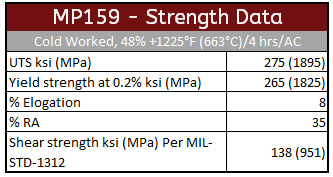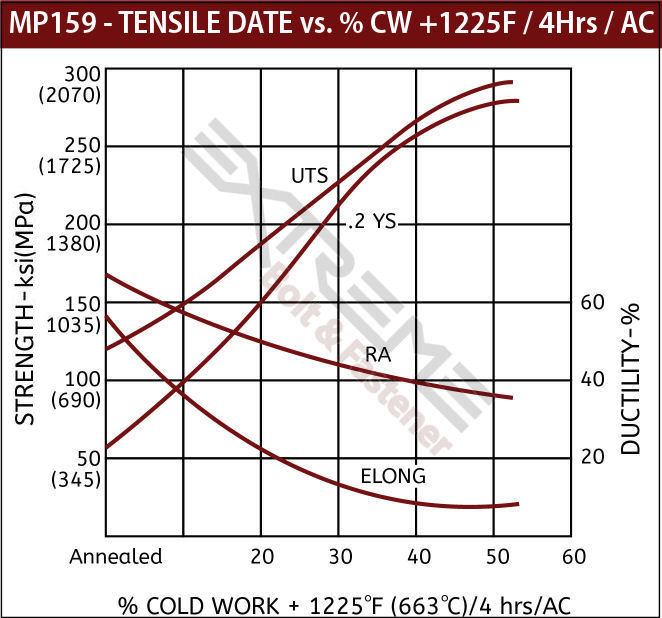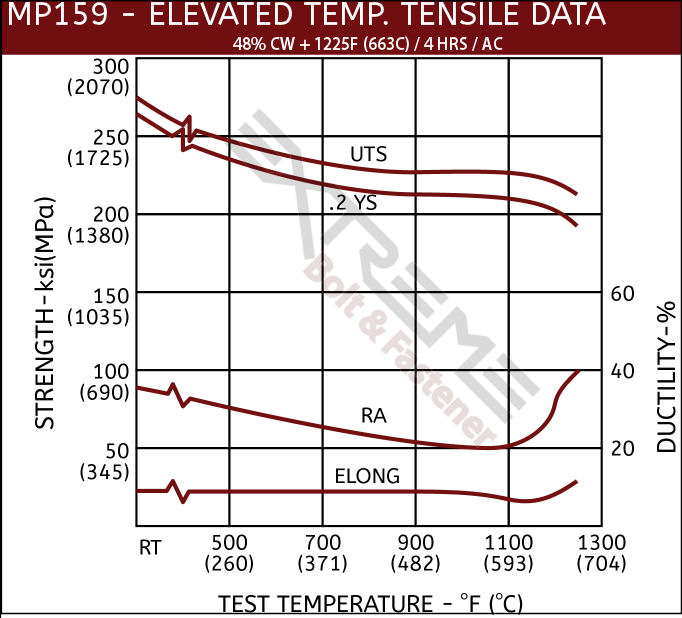Ultra-strength combined with extreme temperature capabilities
 Extreme high strength properties up to 275 ksi ultimate tensile.
Extreme high strength properties up to 275 ksi ultimate tensile.- Maintains superior strength to 1100°F.
- MP159 chemisty and specification
- Datasheet for MP159
- MP159 12 point screw features & benefits
As aerospace engineering advances, so must the materials to meet the technological requirements of this industry. Screws made from MP159 have been developed to provide a solution to high temperature, high strength components. MP159 12 point screws offer strength capabilities similar to other Cobalt Alloys (MP35N) but can be used at much higher temperatures - up to 1100°F, compared to MP35N’s usable limit of 800F. In addition, MP159 screws can be used beyond 1100°F in short term situations.
Key Benefits
- High ultimate tensile strength of 275 ksi and yield strength of 265 ksi (Cold Worked and Age Hardened) combined with excellent ductility and toughness
- Similar corrosion resistance compared to MP35N which is usable in mineral acids, hydrogen sulfide, seawater and salt spray environments.
- Excellent fatigue resistance and creep strength at elevated temperatures
- Excellent resistance to crevice corrosion, stress corrosion cracking and hydrogen embrittlement
Applications
- The aerospace industry relies on MP159 12 point screws for its most advanced gas turbine and jet engines, rocket boosters and jet propulsion systems.
- Power generation and chemical processing utilize MP159 screws for applications that demand high strength at extreme temperatures.
Resources: MP159 Torque Spec
MP159 Screw Types: 12 Point Screws, Button Head Cap Screws, Flat Head Screws, Hex Cap Screws, Hex Cap Screws, Set Screws, Socket Head Cap Screws, Tamper Resistant Security Screws
MP159 12-Point Screw Features & Benefits
The driver of a MP159 12-point screw uses two overlapped hexagon shapes, creating 12-points and a flanged underside. These are also referred to as ferry cap screws or 12 point flange screws. The advantages of this head style include:
- Higher torque capability compared to a socket head cap screw
- Lack of recess to trap fluid or debris.
- As the heads are generally smaller than a hex, MP159 12-point screws are often used situations where installation space is tight and saving weight is critical.
The overall disadvantage is the extra cost involved in forming the heads.
The Controversy of 6 vs. 12 point Bolts
There is much debate over which bolt is better. Some say that the more points a nut or bolt has – such as a 12-point bolt - the less chance you have to round it off. And that the additional contact points of a 12 point screw give you more surface to apply load. While the jury is out as to the accuracy of this, it’s the application that should dictate whether the benefits of a 12 point screw out weight the additional costs of making them.
MP159 Chemistry and Specifications
MP159N Specifications: UNS R30159

MP159 High Strength Data



